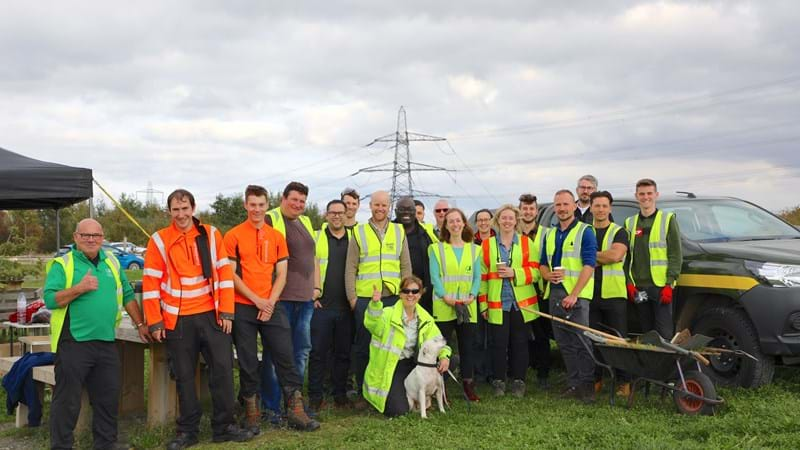22,000 hours of volunteering to help local communities
Published
28 Oct 2021
We want to leave a legacy that is accessible to everyone living and working in the local communities

Share this article
Today (28 October), we have pledged at least 22,000 hours of volunteering in the local community during the construction of the Lower Thames Crossing.
The ambitious volunteering scheme will support projects near the proposed route of the Lower Thames Crossing, both north and south of the River Thames, and reflect four themes; environment, heritage, skills and healthy active communities. Everyone working on the Lower Thames Crossing project will be encouraged to participate in a volunteering activity, with the aim of every single person involved in the project dedicating time to a local cause.
The 22,000 hours of volunteering is the minimum target number of hours that will come from the main companies constructing the Lower Thames Crossing. National Highways wants to beat this number and will be working with the smaller network of companies in the supply chain, when they come onboard, to get them involved; many of which will be based locally.
Throughout the development of the project National Highways has been in dialogue with Local Authorities and community groups to find opportunities to make a difference to local communities and as the project progresses members of the public and local community groups will have the chance to put forward schemes or projects.
Watch our video about this announcement below:
"We welcome this strong commitment from the Lower Thames Crossing to support local communities in Essex"Mark Doran, Director of Sustainable Growth at Essex County Council
Mark Doran, Director of Sustainable Growth at Essex County Council, said:
“We welcome this strong commitment from the Lower Thames Crossing to support local communities in Essex. We are already working closely with National Highways to ensure we maximise the potential for jobs and growth from the Crossing, and we look forward to the additional benefits that this large volunteering effort will bring to the area.”
The Lower Thames Crossing team has already started with its volunteering activities, as a task force was recently working at Forestry England’s Jeskyns Community Woodland near Cobham in Kent. The team focussed on the car parking area and carried out some maintenance activities including weeding shrub beds, kerb cleaning, vegetation cutting between trees and replacement of some failed trees.
National Highways will also fund a biodiversity project that will help transform around 15 hectares of poor condition grassland into a meadow with a diverse mix of wildflowers, creating a better habitat for existing wildlife and encouraging new species. The investment will also include the installation of five interpretation panels and volunteer training to enable the delivery of annual community “BioBlitz” events, where members of the public can take part in identifying plants and animals within the habitats in Jeskyns Woodland.
"By pledging 22,000 hours of volunteering, we will be able to make a real, positive difference to the local communities where we are working"Emily Dawson, Head of Benefits for the Lower Thames Crossing
Emily Dawson, Head of Benefits for the Lower Thames Crossing, said:
“The Lower Thames Crossing is the most ambitious road scheme in the last 35 years, and it is fitting that we should have an equally ambitious volunteering scheme. By pledging 22,000 hours of volunteering, we will be able to make a real, positive difference to the local communities where we are working.
“By working across the four themes of environment, heritage, skills and healthy active communities, we hope to be able to touch as many people’s lives as possible and ensure we leave a legacy that is accessible to everyone living and working in the local communities.”
The Lower Thames Crossing will improve journeys by almost doubling road capacity across the River Thames east of London. If given the green light this new route will help to unlock a wealth of long-term economic benefits, as well as play an important role in the country’s economic recovery by supporting over 22,000 jobs during construction, including hundreds of opportunities for apprentices, graduates, and local businesses.
For almost 60 years the Dartford Crossing has stood as the only crossing between Kent and Essex, a critical link carrying vital food, goods and services between the manufacturing centres, ports, and distribution hubs of the South East, Midlands and North of England. It is designed for 135,000 vehicles a day, but it now often sees 180,000 a day use it, leading to long delays which businesses across the country say act as a barrier to trade and jobs.
For further information contact us at info@lowerthamescrossing.co.uk or by calling 0300 123 5000. You can also get the latest updates on Facebook, Twitter and LinkedIn.
